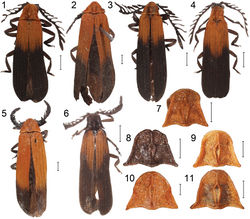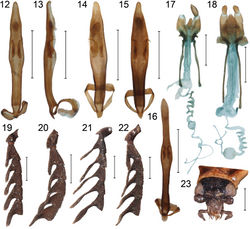Cautires obsoletus
| Notice: | This page is derived from the original publication listed below, whose author(s) should always be credited. Further contributors may edit and improve the content of this page and, consequently, need to be credited as well (see page history). Any assessment of factual correctness requires a careful review of the original article as well as of subsequent contributions.
If you are uncertain whether your planned contribution is correct or not, we suggest that you use the associated discussion page instead of editing the page directly. This page should be cited as follows (rationale):
Citation formats to copy and paste
BibTeX: @article{Bocak2012ZooKeys241, RIS/ Endnote: TY - JOUR Wikipedia/ Citizendium: <ref name="Bocak2012ZooKeys241">{{Citation See also the citation download page at the journal. |
Ordo: Coleoptera
Familia: Lycidae
Genus: Cautires
Name
Cautires obsoletus (Waterhouse, 1878) – Wikispecies link – Pensoft Profile
- Bulenides obsoletus Waterhouse 1878[1]: 109.
- Cautires obsoletus (Waterhouse 1878[1]): Dudkova and Bocak 2010[2]: 43.
- Bulenides lineatus Pic 1921[3]: 8.
- Cautires lineatus (Pic 1921[3]): Dudkova and Bocak: 42 (a junior secondary homonym of Cautires lineatus (Hope in Gray 1831), syn. n.
- Cautires fruhstorferi Bocak and Dudkova 2010: 42 (a replacement name for Bulenides lineatus), syn. n.
- Bulenides javanicus Bourgeois 1883[4]: 439.
- Cautires javanicus (Bourgeois 1883[4]): Dudkova and Bocak 2010[2]: 42, syn. n.
- Bulenides inhumeralis Pic 1921[3]: 7.
- Cautires inhumeralis (Pic 1921[3]): Dudkova and Bocak 2010[2]: 42, syn. n.
- Bulenides nigromaculatus Pic 1925a[5]: 7.
- Cautires nigromaculatus (Pic 1925a[5]): Dudkova and Bocak 2010[2]: 43, syn. n.
- Bulenides pudicus Kleine 1931[6]: 257.
- Cautires pudicus (Kleine 1931[6]): Dudkova and Bocak 2010[2]: 43, syn. n.
Type material
Female, holotype of Bulenides obsoletus. [Indonesia] Java (without further data, BMNH). Female, holotype of Bulenides lineatus. [Indonesia] Java occident., Sukabumi, 2000’, 1893, H. Fruhstorfer (MHNP). Male, holotype of Bulenides javanicus. [Indonesia, Java] Giava, Tcibodas, Ott. 1874, O. Beccari (MHNP). Male, holotype of Bulenides inhumeralis. [Indonesia] Bogor, 1000’, v–vi 96, I. Z. Kannegieter (MHNP). Male, holotype of Bulenides nigromaculatus. [Indonesia] Java occident., Sukabumi 2000’, H. Fruhstorfer (MHNP). Male, holotype of Bulenides pudicus. [Indonesia] Toegoe, West-Jawa-Pasteur (without further data, MIZW).
Differential diagnosis
Cautires obsoletus differs from the other Javanese species in the black pronotum (Fig. 8) and a very oblique border between the bright and dark parts of elytra (Fig. 6). The basal part of elytra is brown to reddish brown and differs from the brightly orange coloration of the other species in Java.
Redescription
.Male. Body small to medium-sized, dorso-ventrally flattened, slender; head, body, posterior half of elytra and appendages dark-brown to black; basal half of elytra brown to reddish brown (Fig. 6), body covered with dense pubescence. Head small, partly hidden in pronotum, clypeus slightly concave, labrum simply rounded, mandibles slender, strongly curved, maxillary palpi slender, apical palpomere pointed; labial palpi similar in shape. Eyes small, hemispherically prominent, their frontal interocular distance 1.15 times eye diameter. Antennae shortly flabellate, 11-segmented, covered with short, dark colored setae (Fig. 20). Pronotum flat, only slightly transverse, 1.15 times wider at base than length at midline; frontal margin projected forward; lateral margins slightly elevated, concave, posterior angles acutely projected, pronotum with moderately wide median areola, attached to middle of basal margin of pronotum, connected to anterior margin by keel occupying one third of midline, lateral keels absent (Fig. 8). Elytra flat, with well developed four primary longitudinal costae; secondary costae considerably weaker, cells regular, mostly slightly longitudinal. Legs laterally flattened, covered with dark colored setae. Male genitalia with phallus widest at midlength and gradually narrowed to apex (Figs 12–13). Female. Body medium-sized, antennae serrate, ovipositor with short valvifers.
Measurements
BL 6.45 mm, PL 1.01 mm, PW 1.36 mm, HW 1.47 mm, Edist 0.51 mm, Ediam 0.44 mm.
Distribution
Cautires obsoletus is known only from several localities in Western Java.
Material examined
2 males, 1 female, Indonesia, W. Java, Puncak Pass nr Bogor, 23. Mar. 1992, H. Arimoto, lgt.; male, [Indonesia] West Java, Puncak Pass, 22. Mar. 1993, Y. Miyake leg. (KMTC, LMBC).
Remark
The holotype of Cautires obsoletus is a strongly damaged female with only a part of one elytron preserved. The basal part of the elytron is testaceous and the loss of reddish coloration may be caused by long-term exposure to light. The holotype of Cautires lineatus is also a female and it differs only in the darker hue of the bright part of the elytra, but it resembles the holotype of Cautires obsoletus in its body shape. The female genitalia of all available specimens are very similar.Holotypes of four other species are males and they do not differ in comparable characters such as body shape and color pattern. Therefore, all these species are considered junior subjective synonyms of Cautires obsoletus.
Taxon Treatment
- Bocak, L; 2012: A revision of the Cautires obsoletus species group from Java (Coleoptera, Lycidae) ZooKeys, 241: 55-66. doi
Other References
- ↑ 1.0 1.1 Waterhouse C (1878) On the different forms occurring in the Coleopterous family Lycidae, with description of new genera and species. Transactions of the Entomological Society London 1878: 95-118.
- ↑ 2.0 2.1 2.2 2.3 2.4 Dudkova P, Bocak L (2010) A review of the Cautires obsoletus species group from Indo–Burma (Coleoptera: Lycidae). Zootaxa 2527: 28-48.
- ↑ 3.0 3.1 3.2 3.3 Pic M (1921) Contribution à l’étude des Lycides. L’Echange 407: 5–8, hors-texte.
- ↑ 4.0 4.1 Bourgeois J (1883) Lycidae nouveaux ou peu connus. Annali del Museo civico di storia naturale Genova 43: 640-666.
- ↑ 5.0 5.1 Pic M (1925a) Malacodermes exotiques. L’Echange 419: 5-8.
- ↑ 6.0 6.1 Kleine R (1931) Zur Kenntnis der Lycidenfauna Javas. Treubia 9: 245-290.
Images
|

